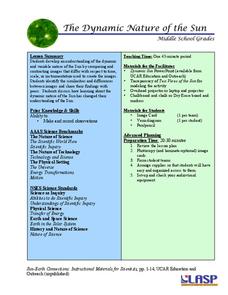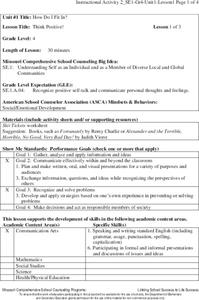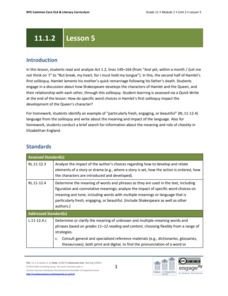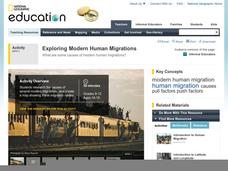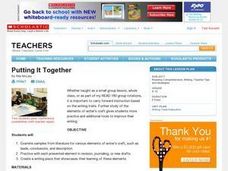HISTORY Channel
The American Presidency Grades 7-9
As part of a study of the American Presidency, groups investigate five topics: Campaigns and Elections, Role and Responsibilities, Life in the White House, Assassination and Mourning, and Communicating the Presidency.
PHET
The Dynamic Nature of the Sun
For this second lesson of the series, pupils learn to observe similarities and differences in photos of the sun and record them in a Venn diagram. Then, small groups practice the same skill on unique images before presenting their...
Missouri Department of Elementary
Think Positive!
Following an attention-grabbing read-aloud, scholars brainstorm ways they can change negative thoughts into positive thoughts. Small groups plan and perform a skit that showcases one of the new ideas to uplift one's feelings....
Earth Day Network
Conserving Water Through Art!
Having fresh, clean drinking water is a privilege many people take for granted. Help raise awareness about the scarcity of water and the importance of conservation by discussing different ways water is used in everyday life. Brainstorm...
Howard Hughes Medical Institute
BiomeViewer
Which holds more influence, the environment over humans or humans over the environment? Young scientists explore an online interactive that addresses this discussion. They observe changes in the natural world over time and see which...
EngageNY
Grade 10 ELA Module 4: Unit 2, Lesson 6
What decisions might an author make about the structure of a play? Pupils participate in an evidence-based discussion about Shakespeare's choices in Macbeth. Next, scholars analyze the effect of Shakespeare's structural choices in Act 2,...
EngageNY
Grade 11 ELA Module 1: Unit 3, Lesson 3
Virginia Woolf didn't believe a woman could have written Shakespeare's works. Using the resource, scholars engage in a silent discussion to analyze how Woolf uses rhetoric to convey her point of view in A Room of One's Own. Pupils write...
EngageNY
Grade 11 ELA Module 1: Unit 2, Lesson 18
How does the comparison of Hamlet to Fortinbras develop Hamlet's character? Scholars complete a Quick Write to answer the question. They also continue their exploration of Shakespeare's Hamlet, reading and discussing Act 4.4.
EngageNY
Grade 11 ELA Module 1: Unit 2, Lesson 16
Using the resource, scholars read Act 3.3 of Shakespeare's Hamlet. They analyze two soliloquies and discuss how Shakespeare develops the characters.
EngageNY
Grade 11 ELA Module 1: Unit 2, Lesson 5
Scholars delve into Act 1.2 of Shakespeare's Hamlet. By completing a writing exercise and participating in a class discussion, they continue to analyze how the author develops the characters in the play.
EngageNY
Close Reading: Paragraph 1 of “Refugee and Immigrant Children: A Comparison” (from “Refugee Children in Canada: Searching for Identity”)
What common challenges do refugees and immigrants face? Using the 9th lesson plan from the 20-part Grade 8 ELA Module 1, Unit 2 series, pupils read about the similarities between refugees' and immigrants' adaptation processes. Partners...
Province of Manitoba
Team-Building and Communication Skills
Scholars learn effective communication and problem-solving skills with a fun team-building exercise. Next, they work together to build a structure using candy and uncooked spaghetti. Finally, they discuss what they learned about how a...
EngageNY
Further Research: Industrial Food Chain
Scholars extend their research of the food chain that Michael Pollan discusses in The Omnivore's Dilemma. They determine additional consequences of the food chain and add them to their Cascading Consequences charts. Additionally, pupils...
Tennessee State Museum
Deciphering the Document: Unlocking the Meaning of the Emancipation Proclamation
Help your learners truly understand the Emancipation Proclamation by asking them the put it into their own words. After reading the document out loud to the class, and briefly discussing the legal language, split your class into small...
Wind Wise Education
Understanding Electric Power Generation
You mean the electricity does not come from the switch? As a class and in small groups, learners explore the sources of energy used to generate electric power. Worksheets guide groups into choosing a future electricity generating...
Curated OER
Compare and Chart the Stories
Elementary schoolers engage in a literature study. They make comparisons of two different versions of a story using a graphic organizer. Using the text and pictures elementary schoolers investigate three elements from the story. Then,...
Curated OER
Bible (Day 7) Redemption and Caretakers
Whether you are religious or not, humans can be caretakers of the Earth. Students will discuss recycling, how their wasteful actions effect the Earth, and the Alaskan oil spill. They then have small group discussion and write about how...
Manchester University
Where The Forest Meets The Sea
Join a father and his son as they explore an isolated location off the coast of Australia in the children's book Where the Forest Meets the Sea by Jeannie Baker. Engage young learners in reading this fun story with this series of...
Odyssey of the Mind
Odyssey of the Mind Curriculum Activity: Performing Arts
The classical arts have made a lasting impact on our society and your advanced learners get to find out why. The activity starts as the children create a list of the arts found in society, they discuss how these art forms impact their...
National Geographic
Exploring Modern Human Migrations
Using maps, images, websites, and handouts, learners work to understand the nature of human migrations. They compare and contrast human migration from the past to the present, identify causes for migration, and trace migration routes on...
Curated OER
News or Propaganda?
What is considered news vs. propaganda? Learners will discuss objectivity and press responsibility while exploring these two concepts. They work in small groups to explore the article in-depth, guided by reading comprehension and...
Shakespeare in American Life
Performing Modernized Shakespeare
“All the world’s a stage…” What do Leonardo DiCaprio, Heath Ledger, and Kenneth Branagh have in common? They have all starred in modern adaptations of Shakespeare’s plays. After viewing a series clips from modern Shakespeare videos,...
Curated OER
Putting It Together in Writer's Workshop
This lesson plan about writing can be taught in small groups or large group settings. They examine basic writing techniques and practice using them to improve their writing.
Curated OER
People Movers
Students investigate how transportation has evolved through the years. Students also generalize how transportation may continue to change in the future. Students work in small groups to brainstorm ideas the identify and solve a...



